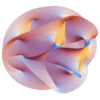Chern–Simons form
In mathematics, the Chern–Simons forms are certain secondary characteristic classes.[1] The theory is named for Shiing-Shen Chern and James Harris Simons, co-authors of a 1974 paper entitled "Characteristic Forms and Geometric Invariants," from which the theory arose.[2]
Definition
Given a manifold and a Lie algebra valued 1-form, over it, we can define a family of p-forms:[3]
In one dimension, the Chern–Simons 1-form is given by
In three dimensions, the Chern–Simons 3-form is given by
In five dimensions, the Chern–Simons 5-form is given by
where the curvature F is defined as
The general Chern–Simons form is defined in such a way that
where the wedge product is used to define Fk. The right-hand side of this equation is proportional to the k-th Chern character of the connection .
In general, the Chern–Simons p-form is defined for any odd p.[4]
Application to physics
In 1978, Albert Schwarz formulated Chern-Simons theory, early topological quantum field theory, using Chern-Simons form.[5]
In the gauge theory, the integral of Chern-Simons form is a global geometric invariant, and is typically gauge invariant modulo addition of an integer.
References
- Freed, Daniel (January 15, 2009). "Remarks on the Chern–Simons forms" (PDF). Retrieved April 1, 2020.
- Chern, Shiing-Shen; Tian, G.; Li, Peter (1996). A Mathematician and His Mathematical Work: Selected Papers of S.S. Chern. World Scientific. ISBN 978-981-02-2385-4.
- "Chern-Simons form in nLab". ncatlab.org. Retrieved May 1, 2020.
- Moore, Greg (June 7, 2019). "Introduction To Chern-Simons Theories" (PDF). University of Texas. Retrieved June 7, 2019.
- Schwartz, A. S. (1978). “The partition function of degenerate quadratic functional and Ray-Singer invariants”. 《Letters in Mathematical Physics》 (English) 2 (3): 247–252. doi:10.1007/BF00406412.
Further reading
- Chern, S.-S.; Simons, J. (1974). "Characteristic forms and geometric invariants". Annals of Mathematics. Second Series. 99 (1): 48–69. doi:10.2307/1971013. JSTOR 1971013.
- Bertlmann, Reinhold A. (2001). "Chern–Simons form, homotopy operator and anomaly". Anomalies in Quantum Field Theory (Revised ed.). Clarendon Press. pp. 321–341. ISBN 0-19-850762-3.
